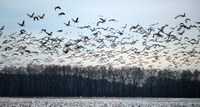Highly pathogenic avian influenza returns to North Dakota
(Click the image below to view a high-resolution image that can be downloaded)
With a recent positive case of highly pathogenic avian influenza (HPAI) in North Dakota, North Dakota State University Extension specialists continue to encourage biosecurity practices for bird owners of all sizes and around wild birds.
“While we hoped there would not be a resurgence of HPAI this fall, we knew this was a possibility,” says Gerald Stokka, NDSU Extension veterinarian and livestock stewardship specialist. “We encourage poultry owners of all sizes to continue biosecurity measures to protect your birds.”
“HPAI is not a food safety concern for consumers,” says Miranda Meehan, NDSU Extension livestock environmental stewardship specialist. “Poultry testing positive for HPAI are prohibited by law from entering the marketplace.”
One of the first clinical signs for a bird is sudden, unexplained death. Most HPAI cases are reporting a decline in water consumption up to 72 hours prior to the unexplained death. Decreased egg production and depression in layers may be another sign that birds are not feeling well. Purple or dry combs, being quieter than normal, frequent laying down and swelling around eyes are other symptoms birds may experience. Chickens and turkeys are most susceptible to HPAI. Waterfowl such as geese and ducks carry the virus and spread it to other birds.
“The best defense against HPAI is having a biosecurity plan in place,” says Mary Keena, NDSU Extension livestock environmental management specialist. “A biosecurity plan is critical in protecting your birds. It is your job as a flock owner to create a line of separation between your clean flock and the potential unclean issues that wildlife or visitors may bring.”
NDSU Extension specialists have developed tips for reducing transmission of HPAI.
To reduce transmission between wild and domestic birds:
- If possible, keep poultry housed until the risk for transmission has decreased. Non-lethal methods to deter wild birds are available on the USDA wildlife damage webpage: www.aphis.usda.gov/aphis/ourfocus/wildlifedamage/sa_reports/ct_wildlife+damage+management+technical+series.
- Reduce the attractiveness for wild birds to stop at your place by cleaning up litter and spilled feed around your domestic poultry housing.
- If you come in contact with or handle wild birds, change into clean clothes, wash your hands and disinfect your footwear prior to contact with domestic birds.
- Report sick or deceased wild birds.
- In the event you need to handle or dispose of carcasses to reduce potential interactions, be sure to follow the appropriate procedures: www.ndsu.edu/agriculture/ag-hub/highly-pathogenic-avian-influenza.
To reduce transmission between domestic flocks:
- Keep your distance. Restrict access to your property and your birds. Allow contact from people who care for your birds but minimize visitors.
- Do not haul disease home. If you have been near other poultry or poultry owners, such as at feed stores, clean and disinfect car and truck tires. New birds should be kept separate from your flock for at least 30 days.
- Do not borrow disease from your neighbor. Do not share lawn and garden equipment, tools or poultry supplies with your neighbor or other poultry owners.
To reduce transmission within wild birds:
- Since little is known about HPAI susceptibility of and transmission through songbirds, you may consider pausing the use of bird feeders and baths which encourage birds to gather together.
- Report sick or deceased wild birds to the North Dakota Game and Fish Department at https://gf.nd.gov/wildlife/diseases/mortality-report. Wild bird avian influenza questions can be directed to 701-328-6300.
“To help protect wild and domestic bird populations from HPAI, it is important that we remain vigilant and report sick and deceased birds,” says Stokka.
Report sick or deceased wild birds to the North Dakota Game and Fish Department at https://gf.nd.gov/wildlife/diseases/mortality-report. Report sick domestic birds to your local veterinarian or the North Dakota State Board of Animal Health at 701-328-2655.
NDSU Agriculture Communication – Sept. 1, 2022
Source: Gerald Stokka 701-231-5082, gerald.stokka@ndsu.edu
Source: Mary Keena, 701-652-2951, mary.keena@ndsu.edu
Source: Miranda Meehan, 701-231-7683, miranda.meehan@ndsu.edu
Editor: Kristin Harner, 701-231-7875, kristin.harner@ndsu.edu


